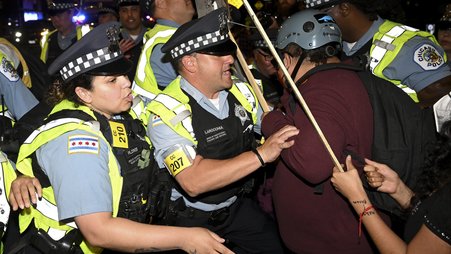
Two new cases will call on the Supreme Court to interpret fundamental First Amendment protections for the press. "File:Panorama of United States Supreme Court Building at Dusk.jpg" by Joe Ravi is licensed under CC BY-SA 3.0.
There’s plenty for journalists to complain about when it comes to social media platforms. Harassment of journalists runs rampant, online ads bleed revenue from local news outlets, and some platforms have shut out news entirely. But when it comes to two new cases before the Supreme Court, journalists and the news media must stand up for platforms’ First Amendment rights — or risk undermining their own.
NetChoice v. Paxton and Moody v. NetChoice both involve the First Amendment right of platforms to engage in content moderation, or enforcement of rules around what users can say on a social media service. These cases have the potential to reshape First Amendment rights online. But they could also impact the First Amendment rights of journalists and news organizations, by teeing up the court to reconsider fundamental First Amendment protections for the press.
At issue in both cases is the court’s decision in Miami Herald v. Tornillo, a landmark free press decision from 1974. In Tornillo, the court struck down a Florida law that gave candidates for office a right to publish an answer to a newspaper’s criticism of their “personal character or official record.” It held that the First Amendment prevents the government from regulating newspapers’ exercise of “editorial discretion,” i.e., decisions about what to print and how to cover newsworthy issues. Without this protection, the court said, the government could censor what people are allowed to read and know.
In the NetChoice cases, the platforms argue that under Tornillo, the First Amendment also protects their right to decide what content to host or remove. The Fifth Circuit rejected this argument and upheld the Texas law prohibiting platforms from removing content based on the poster’s viewpoints. But the Eleventh Circuit struck down a similar Florida law and agreed that the platforms’ content moderation decisions are constitutionally protected exercises of editorial judgment. Now, the Supreme Court will decide whether and how Tornillo applies to platforms’ content moderation.
The court’s decision has the potential to weaken Tornillo’s protections for editorial discretion — not just for social media platforms, but for the traditional news media, too. For example, if the court decides that Tornillo doesn’t apply to platforms because they’re too dissimilar to print newspapers, as the Fifth Circuit held, that could have troubling implications for modern news organizations.
Online news sites and journalists who publish on blogs or social media today also operate differently from print newspapers of the past. For example, they’re not subject to the same space limitations that can make it difficult for physical newspapers to print candidates’ rebuttals. But those differences don’t mean their decisions about what to publish or not are any less deserving of First Amendment protection.
The same is true for social media platforms. A lot of content moderation requires making nuanced judgment calls about what falls on one side of a platform’s rules or another: Is a post impersonating someone fraudulent or is it satire? Does a post contain forbidden sexual content or is it sex education? And even if a post doesn’t violate any rules, platforms are free to decide what content they want to carry, just like book stores can choose what books to sell.
These are precisely the kinds of editorial decisions that Tornillo held are protected. Just like the government can’t tell a newspaper it must print a politician’s reply to criticism, it can’t tell a platform it must carry particular content. On the flip side, the government also can’t forbid a newspaper from publishing or a platform from hosting content that’s legal, like hate speech or disinformation, both of which are constitutionally protected speech. (Of course, we’re all still free to use our First Amendment rights to condemn newspapers or platforms that decide to publish or host that content.) If the court undermines this principle for platforms in the NetChoice cases, it could also undermine it for the press in the future.
And while politicians may be going after social media for “anti-conservative bias” today, those same attacks threaten the news media. For example, former (and perhaps future) President Donald Trump hasn’t been shy about his desire to go after broadcasters that he views as being “too liberal.” As president, Trump suggested the government could revoke NBC and other broadcasters’ licenses in retaliation for unfavorable reporting. More recently as a candidate, Trump has promised to investigate Comcast for “treason” if he’s re-elected, claiming the reporting of its subsidiaries NBC News and MSNBC is “dishonest and corrupt.”
There are a lot of legal problems with Trump’s plan to revoke broadcast licenses based on content, as his own FCC chair pointed out when Trump first threatened NBC. But if the court accepts Texas and Florida’s arguments in the NetChoice cases — that market “dominance” can justify government limits on editorial decision-making power — it could also diminish First Amendment protections for broadcasters and other news outlets at a perilous moment for the news media.
The court will also consider another First Amendment issue in the NetChoice cases: the constitutionality of provisions requiring the platforms to tell each user when their content is moderated. While we’re all for voluntary transparency, this kind of government-mandated transparency raises First Amendment concerns. Depending on how the court resolves this second issue, its decision could open the door to future transparency mandates aimed directly at the press.
Although social media platforms and journalists can be at odds, for now their First Amendment fates may be bound. Journalists and news outlets shouldn’t be shy about defending the platforms’ First Amendment freedoms in the NetChoice cases, no matter how upset they may be about some platforms’ recent attitudes towards the press. The news media’s own rights may depend on it.



